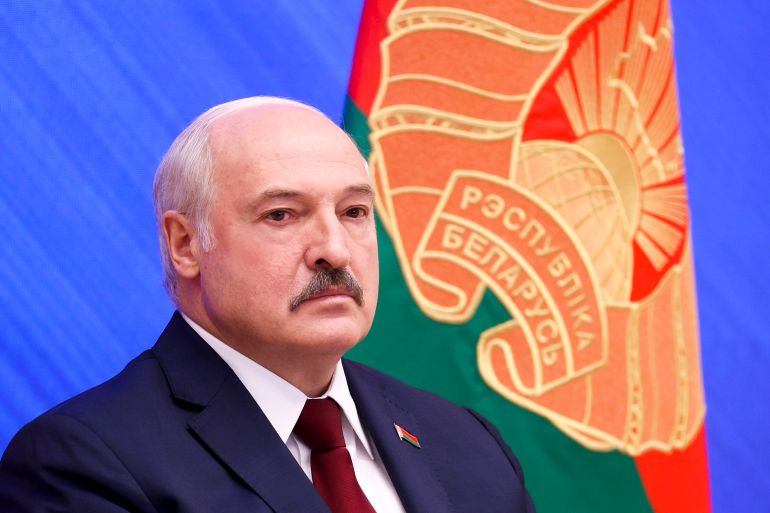Lukashenko says Belarusian Olympic defector was ‘manipulated’
Belarus president comments on Tsimanouskaya as he defends election victory and accuses opponents of plotting ‘coup’.

Belarusian President Alexander Lukashenko has said the Belarusian sprinter who defected at the Olympic Games in Tokyo had been “manipulated” by outside forces and would not have fled abroad otherwise.
Defiant on the first anniversary of a disputed election that extended his decades-long rule, he also defended his victory on Monday at an annual news conference, accusing his opponents of plotting a “coup”.
Keep reading
list of 4 itemsIs political repression worsening in Belarus?
Poland, Lithuania call for EU help amid Belarus migration row
‘Freedom is worth fighting for’: Belarus activists go on trial
“Today, Belarus is in the focus of the attention of the whole world,” Lukashenko said during the hours-long event at the presidential palace building in the capital Minsk.
“She wouldn’t do it herself, she was manipulated,” Lukashenko said, referring to the Olympic athlete Krystsina Tsimanouskaya.
It was from Japan, from Tokyo that she contacted her buddies in Poland and they told her – literally – when you come to the airport, run to a Japanese police officer and shout that those who dropped her off at the airport are KGB agents.
“There was not a single special service agent in Japan.”
Lukashenko was thrust into the international spotlight again this month after Tsimanouskaya, 24, refused to obey team orders to leave the Tokyo Olympics early and travel back to Belarus.
Claiming she feared for her safety in her homeland, she instead sought refuge in Poland, which granted her and her husband humanitarian visas.
Disputed election
The August 9 election last year handed Lukashenko, 66, a sixth term in office but was denounced by the ex-Soviet nation’s political opposition as rigged.
Lukashenko said on Monday that he won last year’s presidential poll fairly and was protecting his country against a violent uprising.
Last year, some people “were preparing for a fair election, while others were calling … for a coup d’état,” he said.
Thousands of people attended anti-government demonstrations following the vote, a movement that posed the biggest challenge to Lukashenko’s rule since he first became president in 1994.
He responded by unleashing a sweeping crackdown that saw thousands of people arrested and his leading opponents jailed or forced into exile abroad.
While protests in the country have since simmered down, authorities have continued their crackdown on dissent in recent weeks, targeting independent journalists and democracy activists in hundreds of raids.
On Sunday, Belarusians living abroad held rallies against Lukashenko in European capitals including Kyiv, London, Warsaw and Vilnius.
Russian backing
At loggerheads with Western countries that imposed sanctions on his government, Lukashenko has stayed in power thanks to support and financial backing from traditional ally Russia, which sees Belarus as a buffer state against NATO and the European Union.
In a sign of further tension, the United Kingdom imposed sanctions on Belarus’s potash and petroleum product exports on Monday in an attempt to put pressure on Lukashenko, who swiftly retorted that London should “choke on” the new measures.
Canada and the United States also rolled out new sanctions against Minsk on Monday, with Washington saying its move was aimed at countering Lukashenko’s “illegitimate effort to hold on to power”.
So far, Western sanctions have done little to persuade Lukashenko to change course.
Al Jazeera’s Andrew Simmons, reporting from London, said the Belarusian leader was unlikely to be swayed by the latest measures.
“His stand has been one of defiance and will continue to be that way,” Simmons said. “And the more the West pushes against him, the more he will move towards Russia.”
Lukashenko has previously denounced his opponents as foreign stooges and accused leading NATO member the US and its allies of plotting to overthrow him.
Lukashenko has also tussled with the European Union after Belarusian authorities forced a Ryanair flight flying over Belarus to land in the capital, Minsk, in May and arrested a dissident Belarusian journalist who was on board.
Separately, EU neighbours Lithuania and Poland have accused the government in Minsk of engineering a migrant crisis on the Belarusian border in retaliation for EU sanctions.
Lukashenko said Lithuania and Poland are to blame.